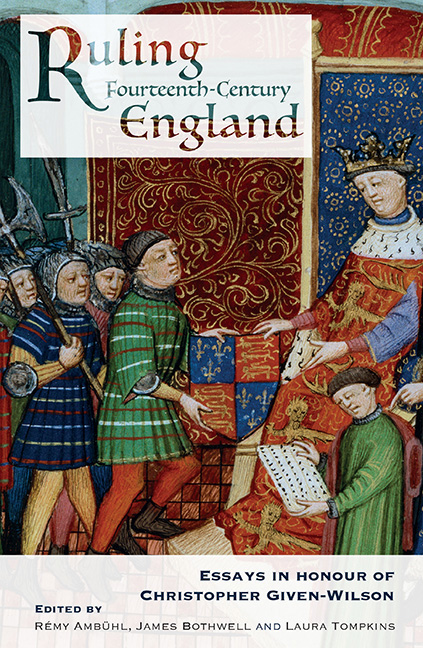Book contents
- Frontmatter
- Contents
- Contributors
- Abbreviations
- Introduction
- The Efficiency of English Royal Administration in the Last Years of Edward I
- Government and Market in the Early Fourteenth Century
- Kings' Clerks: The Essential Tools of Government
- Edward II: Favourites, Loyalty and Kingship
- The Perils of Lordship: The Life and Death of William Tuchet (c. 1275–1322)
- ‘War’, ‘Rebellion’ or ‘Perilous Times’? Political Taxonomy and the Conflict in England, 1321–2
- The Carlisle Roll of Arms and the Political Fabric of Military Service under Edward III
- What's in a Title? Comital Development, Political Pressures and Questions of Purpose in Fourteenth-Century England
- Edward the Black Prince: Lordship and Administration in the Plantagenet Empire
- ‘Said the Mistress to the Bishop’: Alice Perrers, William Wykeham and Court Networks in Fourteenth-Century England
- The Politics of Surrender: Treason, Trials and Recrimination in the 1370s
- Richard II in the Mirror of Christendom
- Bibliography
- Index
- Tabula Gratulatoria
The Politics of Surrender: Treason, Trials and Recrimination in the 1370s
Published online by Cambridge University Press: 18 September 2019
- Frontmatter
- Contents
- Contributors
- Abbreviations
- Introduction
- The Efficiency of English Royal Administration in the Last Years of Edward I
- Government and Market in the Early Fourteenth Century
- Kings' Clerks: The Essential Tools of Government
- Edward II: Favourites, Loyalty and Kingship
- The Perils of Lordship: The Life and Death of William Tuchet (c. 1275–1322)
- ‘War’, ‘Rebellion’ or ‘Perilous Times’? Political Taxonomy and the Conflict in England, 1321–2
- The Carlisle Roll of Arms and the Political Fabric of Military Service under Edward III
- What's in a Title? Comital Development, Political Pressures and Questions of Purpose in Fourteenth-Century England
- Edward the Black Prince: Lordship and Administration in the Plantagenet Empire
- ‘Said the Mistress to the Bishop’: Alice Perrers, William Wykeham and Court Networks in Fourteenth-Century England
- The Politics of Surrender: Treason, Trials and Recrimination in the 1370s
- Richard II in the Mirror of Christendom
- Bibliography
- Index
- Tabula Gratulatoria
Summary
When was surrendering a castle an acceptable and honourable course of action? Was surrendering a castle ever an acceptable and honourable undertaking? These were questions which generated considerable debate in the course of the Hundred Years War, but never more intensely than in the 1370s, when the combination of a decline in English military fortunes and the absence of a fully functioning king dramatically intensified public concern over the loss of strategically important and prestigious fortresses. Our intention is to explore the political ramifications of surrendering, focussing initially on the trial in October 1377 of Jean de Jauche, lord of Gommegnies, and William Weston for the loss, respectively, of the castles of Ardres and Audruicq in the Calais Pale, before broadening our discussion to consider wider conceptual and normative contexts. We want to consider what drove the captains of castles to seek terms with their besiegers, how much licence these men were given by the crown unilaterally to negotiate in this way, why decisions taken ‘in the field’ became so highly charged politically, and how far the actions of these men accorded with contemporary views on the proper conduct of garrison commanders. The topic provides a suitable platform for the conjoining of our own respective research areas, but it also neatly dovetails with two of the central strands of Chris Given-Wilson's pioneering and hugely influential work on prisoners of war and the parliament rolls of late medieval England. It is an age-old truism that politics and warfare are two sides of the same coin and that each responds to, and influences, the course of the other: what happened in the 1370s brings into especially sharp focus the full extent of this symbiosis.
The surrender of Ardres and Audruicq
Perhaps because the parliament of October 1377 was notable in so many other ways – it was the first of Richard II's reign and marked a decisive shift in political climate following the turbulent last years of Edward III's rule – the detailed account of the trial of Jean de Jauche, lord of Gommegnies, and William Weston has never received detailed scrutiny. Ardres and Audruicq had been lost only a matter of weeks before parliament met.
- Type
- Chapter
- Information
- Ruling Fourteenth-Century EnglandEssays in Honour of Christopher Given-Wilson, pp. 227 - 262Publisher: Boydell & BrewerPrint publication year: 2019
- 1
- Cited by



